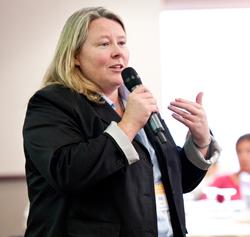
USC Shoah Foundation’s associate director of research, Dan Leshem, participated in Cardozo School of Law’s Law and Film course taught by documentary filmmaker/historian Christian Delage on Sept. 29.
USC Shoah Foundation’s associate director of research, Dan Leshem, participated in Cardozo School of Law’s Law and Film course taught by documentary filmmaker/historian Christian Delage on Sept. 29.
The creators of a transmedia novel that has captivated students around the world have entered into a partnership with USC Shoah Foundation’s Visual History Archive and educational website IWitness.
In October 1943 the Danish underground helped transport over 7,000 Danish Jews to Sweden. Esther Chalupovitsch remembers the night her family escaped Nazi controlled Denmark on a fishing boat to Sweden.
Even though they were surrounded by members of Hollywood elite and New York society, a group of teenagers seemed to steal the spotlight at the Oct. 3 Ambassadors for Humanity gala.